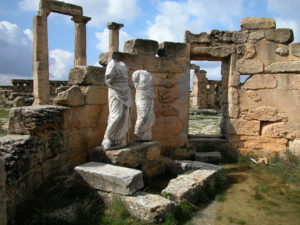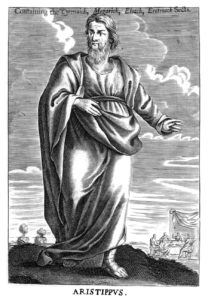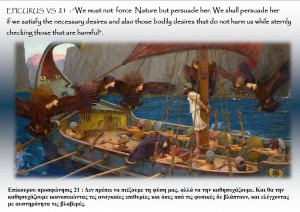The following is part of a book review of Cyreniacs Handbook: Handbook of Source Material for Cyrenaic Philosophy.
Theodorus the Atheist was discussed in a previous series of essays about the Cyrenaics. Like the other thinkers who were highlighted, he also founded a sect that bore his name. According to the Handbook,
Theodore was the founder of that branch of the Cyrenaic sect which was called after him “Theodorei”, “Theodoreans.” The general characteristics of the Cyrenaic philosophy are described elsewhere. The opinions of Theodore, as we gather them from the perplexed statement of Diogenes Laertius (ii. 98) partook of the lax character of the Cyrenaic school.
He taught that the great end of human life is to obtain joy and avoid grief, the one the fruit of prudence, the other of folly; that prudence and justice are good, their opposites evil; that pleasure and pain are indifferent. He made light of friendship and patriotism, and affirmed that the world was his country. He taught that there was nothing really disgraceful in theft, adultery, or sacrilege; but that they were branded only by public opinion, which had been formed in order to restrain fools … The wise man would indulge his passions openly without the least regard to circumstances.
But the great charge against him was atheism. “He did away with all opinions respecting the Gods,” says Laertius, but some critics doubt whether he was absolutely an atheist, or simply denied the existence of the deities of popular belief. The charge of atheism is sustained by the popular designation of Theodoras ”Atheus,” by the authority of Cicero (de Nat. Deor. i. 1), Laertius, Plutarch (De Placit. Philos. i. 7), Sextus Empiricus (Pyrrhon. Hypotyp. lib. iii.), and some of the Christian Fathers; while some other authorities speak of him as only rejecting the popular theology. Theodore wrote a book “Concerning God”, De Diis, which Laertius–who had seen it–says (ii. 97) was not to be disdained; and he adds that it was said to have been the source of many of the statements or arguments of Epicurus. According to Suidas he wrote many works both on the doctrines of his sect and on other subjects.
Elsewhere, it says:
Theodorus considered joy and grief to be the supreme good and evil, the one brought about by wisdom, the other by folly. Wisdom and justice he called goods, and their opposites evils, pleasure and pain being intermediate to good and evil. Friendship he rejected because it did not exist between the unwise nor between the wise; with the former, when the want is removed, the friendship disappears, whereas the wise are self-sufficient and have no need of friends.
Notice the statement on how Laertius held Theodorus’ book on divinity in high esteem, and considered it to be the source for “many of the arguments” we find in the Epicurean theories on theology and piety. Now, let’s consider this in light of what we know of Epicurean theology, as attested in Principal Doctrine 1 and Philodemus’ scroll On Piety. PD1 states:
A happy and eternal being has no trouble himself and brings no trouble upon any other being; hence he is exempt from movements of anger and partiality, for every such movement implies weakness.
The Monadnock translation says:
That which is blissful and immortal has no troubles itself, nor does it cause trouble for others, so that it is not affected by anger or gratitude (for all such things come about through weakness).
The pattern that immediately becomes evident here is that, just as Theodorus used to teach his philosophy in terms of pairs of opposites (joy/grief, prudence/folly, etc.), we see here a focus on “anger and partiality / gratitude“. Scholars have pointed out that this has to do with the gods’ autarchy (self-sufficiency): they do not need anything from anyone, ergo they are not of the constitution that would experience anger or gratitude, as no creature may harm or benefit them. We know from Lampe’s book that autarchy was one of the cardinal virtues of Theodorus, so this fits his profile, particularly if the gods are to be seen as ethical guides.
Also notice that these aspects of the theology do not touch on the physics. Unlike Epicurus, Theodorus was not of the lineage of Democritus and may not have come up with a physical theory of gods as super-evolved animals with bodies made of particles, as we see in Epicurean theology. This indicates that his ideas in the work On the Gods cited by Laertius (which seem to have influenced Epicurus) may have focused, instead, on the ethical aspects of the gods. Hence the two key attributes that Epicurus considers taboo to ascribe to deities in his Epistle to Menoeceus:
Do not ascribe to god anything that is inconsistent with immortality and blissfulness; instead, believe about god everything that can support immortality and blissfulness.
Some translations use the word happiness (that is: always abiding in pleasure, which fits the ethical ideal of hedonism), and indestructible (which fits the definition of a god). In the case of the gods’ immortality, Epicurus may have developed this theory by linking it to his atomist physics.
Like Epicurus, Theodorus seems to not have been a real atheist (in spite of his epithet “Theodorus the Atheist”). He seems to have rejected the vulgar and popular beliefs about the gods, as Epicurus did, and for that reason they were both misbranded atheists. Diogenes Laertius, in Life of Aristippus (2.97-104), says:
The Theodoreans derived their name from Theodorus, who has already been mentioned, and adopted his doctrines. Theodorus was a man who utterly rejected the current belief in the gods. And I have come across a book of his entitled Of the Gods which is not contemptible. From that book, they say, Epicurus borrowed most of what he wrote on the subject.
Here, we see that Anniceris is not the only proto-Epicurean in the Cyrenaic lineage. The Handbook has this to say of Theodorus, which could have easily been attributed to Epicurus, as it is consistent with his instruction that one should philosophize not for Greece, but for oneself:
It was reasonable, as he thought, for the good man not to risk his life in the defense of his country, for he would never throw wisdom away to benefit the unwise.
Elsewhere, the Handbook says of Theodorus:
He said the world was his country.
These teachings are identical to the Epicurean conception of cosmopolitanism, which is sustained by an anarchic spirit that choose nature over culture, true friends over imaginary or Platonic communities.
Further Reading:
Cyreniacs Handbook: Handbook of Source Material for Cyrenaic Philosophy





